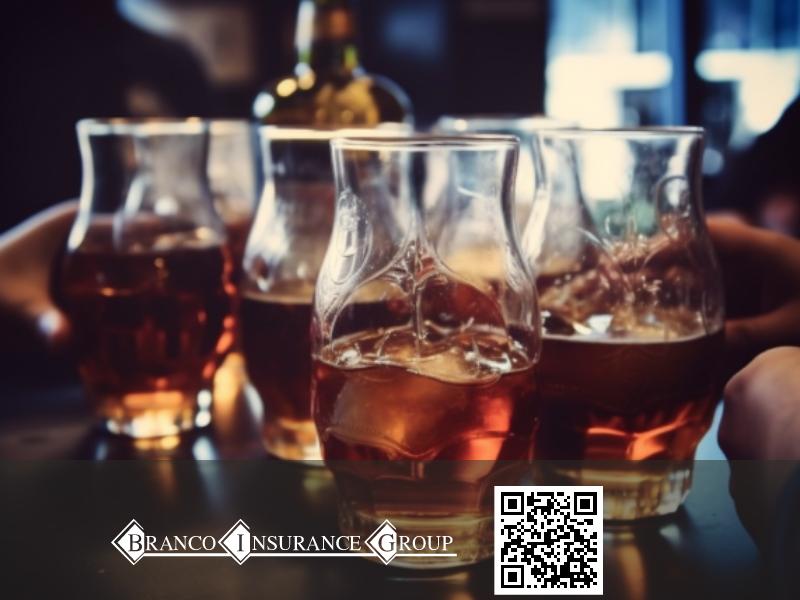
How Employees Can Help Reduce Cybersecurity Risks
Many small businesses conduct themselves directly online. Having employees who are not properly trained in cybersecurity can increase the risk of a cyberattacks. Adequate cybersecurity

Navigating the world of insurance can be overwhelming, especially for businesses involved in the sale or service of alcoholic beverages. One crucial coverage often overlooked is Liquor Liability Insurance—protection that can make all the difference when faced with potential lawsuits and financial losses.
In this blog, we’ll break down what liquor liability insurance is, why it’s essential for your business, and how to choose the right policy suited to your needs.
Liquor liability insurance provides coverage for businesses that manufacture, serve, or sell alcohol and protects them from claims of bodily injury or property damage if they sell, make, or serve alcohol.
Liquor liability insurance is a crucial protection measure for businesses involved in the sale, production, or serving of alcoholic beverages.
For example, let’s say an intoxicated customer leaves your bar after being served drinks and gets into an accident resulting in injuries to themselves or others. Without liquor liability coverage in place, your business could be held responsible for any damages incurred by those affected – which can reach astronomical amounts.
This type of insurance offers you peace of mind by providing financial support and protecting your business against potential lawsuits stemming from alcohol-related incidents.
In many states across the United States, liquor liability insurance is not just a smart business move but also a legal requirement for obtaining and maintaining a liquor license.
These requirements are in place to ensure that businesses serving or selling alcoholic beverages take responsibility for any potential negative consequences resulting from alcohol consumption.
The importance of having liquor liability insurance cannot be overstated as it protects businesses from financial losses stemming from lawsuits involving bodily injury or property damage caused by an intoxicated customer.
Suppose that one of your patrons has too much to drink at your establishment and gets involved in a car accident on their way home. In this case, you could be held liable for medical bills, vehicle repair costs, and other associated expenses if it’s determined that over-serving contributed to the incident.
Not all businesses have the same exposure when it comes to alcohol-related incidents; therefore, understanding what type of coverage suits best according to specific situations is imperative.
For example, host liquor liability insurance may suffice for companies holding occasional events where alcohol is served (e.g., annual holiday parties), whereas establishments like bars or restaurants might require more extensive policies due to daily operations involving selling alcoholic beverages.
As a business owner or event organizer, it’s important to know whether your establishment needs liquor liability insurance. There are various types of businesses that typically require this type of coverage to protect against potential lawsuits and financial losses stemming from alcohol-related incidents. Some common examples include:
1. Bars and Nightclubs: These establishments primarily focus on serving alcoholic beverages and are often high-risk environments for alcohol-related incidents.
2. Restaurants and Cafes: If your restaurant serves alcohol alongside food offerings, you’ll need insurance coverage for any alcohol-related claims.
3. Breweries and Wineries: Businesses that produce alcoholic beverages or offer tastings also require liquor liability protection.
4. Liquor Stores: Establishments selling alcohol for off-premise consumption must carry liquor liability insurance to cover potential legal fees and bodily injury claims.
5. Event Venues: If your venue hosts events where alcohol is served or sold, you’ll need coverage for any resulting incidents.
6. Catering Companies: If your catering company supplies alcoholic beverages as part of its service, be sure to have adequate liquor liability coverage in place.
7. Hotels: Since many hotels offer room service with alcoholic beverages or have on-site bars, they will typically need liquor liability insurance.
Keep in mind that even if your business does not sell or serve alcohol directly but allows it to be consumed on the premises, host liquor liability insurance may be necessary to provide protection from any risks associated with intoxicated guests or patrons.
Liquor liability insurance has numerous benefits, including protection against lawsuits and financial losses, promoting responsible alcohol service, and coverage for property damage caused by an intoxicated person.
Liquor liability insurance protects businesses from financial losses and lawsuits that may arise as a result of alcohol-related incidents. If someone gets injured or damages property after consuming alcohol at your business or event, you could be held liable for the cost of medical bills, legal fees, and compensation for damages.
Without liquor liability coverage, handling these costs out-of-pocket can potentially bankrupt your business. For example, if a patron becomes intoxicated at your bar and causes a car accident on their way home, the victim may sue both the driver and your establishment for serving them too much alcohol.
As a business that serves or sells alcohol, promoting responsible alcohol service is crucial. Liquor liability insurance can help mitigate the risks associated with serving alcohol and promote responsible behavior among patrons.
Having liquor liability insurance also shows that a business is committed to promoting responsible drinking because it demonstrates that they are taking proactive steps to protect their customers and employees from harm.
It can also help in reducing potential claims or lawsuits resulting from alcohol-related incidents, which ultimately benefits all parties involved.
As with any type of insurance, there is a potential for higher premiums and deductibles when it comes to liquor liability insurance. The risks associated with serving alcohol can put businesses at a greater financial risk, which is why insurers may charge more for coverage.
It’s important to note that including deductibles in liquor liability insurance policies is not uncommon. Deductibles are designed to minimize fraudulent claims, but they also require establishments to assume some financial responsibility in the event of an incident involving their patrons.
When choosing the right liquor liability insurance, it’s important to research and compare options, work with a knowledgeable insurance agent, consider cost factors and ways to reduce insurance costs, and carefully review policy limitations and exclusions.
When shopping for liquor liability insurance, it’s important to take the time to research and compare your options. Here are some tips for finding the best coverage for your business:
1. Evaluate your specific needs: Consider the type of business you run and the amount of alcohol you serve or sell. This will help determine the appropriate coverage limits and policy options.
2. Look for reputable insurers: Check online reviews and ask other business owners in your industry for recommendations.
3. Obtain multiple quotes: Get quotes from several insurers to compare coverage, premiums, deductibles, and other factors.
4. Understand policy details: Be sure to read each policy thoroughly and understand what is covered and what is not, including any exclusions or limitations.
5. Assess customer service: Consider factors such as response times, claims handling procedures, and overall customer satisfaction when choosing an insurer.
By taking these steps and working with a knowledgeable insurance agent, you can ensure that you have the right level of liquor liability coverage to protect against potential risks related to serving or selling alcoholic beverages at your business.
As someone looking for liquor liability insurance, it can be daunting to navigate the world of insurance policies on your own. That’s why I highly recommend working with a knowledgeable insurance agent who specializes in this type of coverage.
Insurance agents have access to multiple carriers and can shop around on your behalf to find the best possible coverage at an affordable price. They also understand state-specific laws regarding liquor liability and can ensure that you are fully compliant with any legal requirements in your area.
By consulting with an expert, you’ll have peace of mind knowing that your business is protected from potential lawsuits or damages resulting from alcohol-related incidents.
When purchasing liquor liability insurance, it’s essential to consider various factors before settling on a policy. One of the critical considerations is ensuring that you have enough coverage limits to protect your business in the event of a claim.
You should also review different insurance companies and compare their rates and coverage options to find the best value for your money. Work with an experienced agent who can guide you through any questions or concerns you may have about purchasing liquor liability insurance.
Understanding the cost factors and ways to reduce insurance costs is essential when looking to purchase liquor liability insurance for your business. The following table outlines some common cost factors and ways to potentially lower those costs:
| Cost Factors | Ways to Reduce Insurance Costs |
|---|---|
| Type of Business | Consider the specific risks associated with your business type and tailor your coverage accordingly, which can lower your premiums. |
| Extent of Coverage | Assess the level of coverage needed to minimize financial risk but avoid over-insuring, which can lead to higher premiums. |
| Exposure | Implement risk management practices to reduce the likelihood of alcohol-related incidents, such as employee training programs and strict ID verification policies. |
| Location | Consider the demographics and crime rates in your business’s location, as they can influence insurance costs, and implement appropriate security measures to minimize risks. |
| Claims History | Maintain a clean claims history by promoting responsible alcohol service and addressing any issues that could lead to claims promptly. |
| Complementary Policies | Bundle your liquor liability insurance with other insurance policies, such as general liability or property insurance, to potentially obtain discounts from the insurance provider (as mentioned in Fact 5). |
Keep these factors and recommendations in mind when choosing liquor liability insurance to ensure you find the best coverage for your business while keeping costs manageable.
Liquor liability insurance is a crucial protection for businesses that sell or serve alcohol. It safeguards against lawsuits and financial losses associated with bodily injury or property damage caused by intoxicated individuals.
Choosing the right coverage can be complex, so it’s essential to research and compare options, work with a knowledgeable agent, and consider cost factors. Implementing responsible alcohol service practices can also help reduce risks and premiums. If you have additional questions about liquor liability insurance our experts at Branco Insurance Group are here to help. Contact us today for a free consultation.
We understand the importance of staying protected and will work with you to develop an insurance plan that meets your needs. With dedicated customer service and competitive rates, we can provide comprehensive coverage to ensure peace of mind in case of an incident related to alcohol. Let us help you find the right liquor liability coverage for your business.
No matter what type of business you operate, liquor liability insurance is essential. Alcohol-related incidents can cost businesses thousands of dollars in legal fees and damages, so it’s important to make sure you are adequately protected from any potential liabilities.
Liquor Liability Insurance provides coverage for businesses selling or serving alcohol against claims of property damage, personal injury or death caused by a patron consuming alcohol on their premises.
If you own a business that sells or serves alcohol, you could be held liable for any accidents, injuries or damages caused by an intoxicated patron. Having Liquor Liability Insurance helps protect your business and assets from lawsuits that may arise as a result.
Any business that serves, sells, manufactures or distributes alcoholic beverages can benefit from having Liquor Liability Insurance. This includes bars, restaurants, nightclubs and even event planners hosting events where alcohol will be served.
Most general liability insurance policies exclude coverage for liquor-related claims. It is important to have a separate Liquor Liability Insurance policy to ensure coverage in the event of an accident or injury caused by an intoxicated patron at your establishment.

Many small businesses conduct themselves directly online. Having employees who are not properly trained in cybersecurity can increase the risk of a cyberattacks. Adequate cybersecurity

Because seasonal changes affect your vehicle in a multitude of ways, it’s important to prepare for the transition from summer to fall. You’ll want to
